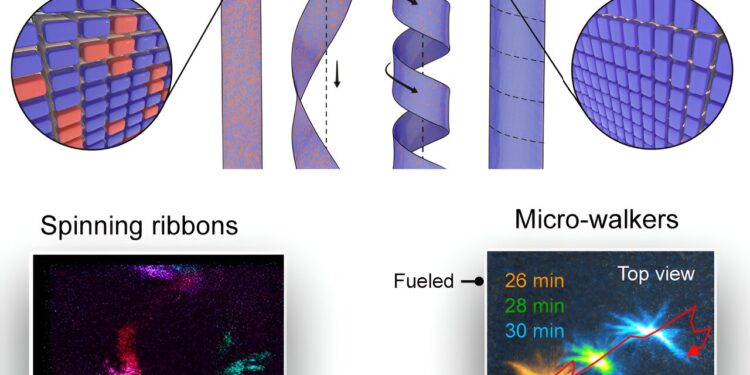Credit: Chemistry (2024). DOI: 10.1016/j.chempr.2024.08.016.
Researchers at the Technical University of Munich (TUM) have developed an artificial engine at the supramolecular level that can generate impressive power. This hand-wound engine is a tiny ribbon made of special molecules. When energy is applied to it, this ribbon aligns, moves like a small fin and can thus push objects. For the first time, the energy required for this process comes from a chemical fuel.
Until now, the conversion of chemical energy into rotational energy at the supramolecular level, i.e. for small objects made up of several molecules, was known only from biology. Primitive bacteria, called archaea, use the chemical fuel ATP to rotate their tiny fin-like locomotion organs, the flagella, and thus move.
Until now, there were no synthetic replicas of this process. In the future, this new development could be used in nanorobots that swim in blood vessels to detect tumor cells, for example.
Chemical fuel drives rotation
The peptide ribbons developed by a team led by Brigitte and Christine Kriebisch and Job Boekhoven, professor of supramolecular chemistry, are a few micrometers long and a few nanometers wide. When a chemical fuel is added to them, they acquire a structure and the ribbons roll up into small tubes, which causes them to start rotating. This process can even be observed live under a microscope.
The researchers found that they could control the speed of rotation of the ribbons based on the amount of fuel added. In addition, the direction of rotation – clockwise or counterclockwise – can be influenced by the structure of the molecular building blocks of the ribbons. The research results were published in Chemistry.
Crawling on surfaces
In collaboration with Professor Matthias Rief, Professor of Molecular Biophysics at TUM, who works on cutting-edge optical measurement methods, the researchers discovered that the ribbons exert enough force on their surroundings to move objects as small as a micrometer. Determining the force is one of the most important results for practical use.
If several rotating ribbons are brought together at a central point, small “micro-walkers” are formed, for example, which can crawl over surfaces. In the future, after further improvements, these micro-walkers could possibly be used for medical applications such as transporting drugs into the body. The fuel used is not yet suitable for this purpose, as it would be harmful to the body.
More information:
Brigitte AK Kriebisch et al, Synthetic flagella rotate and contract at the expense of chemical fuel, Chemistry (2024). DOI: 10.1016/j.chempr.2024.08.016. www.cell.com/chem/fulltext/S2451-9294(24)00431-5
Journal information:
Chemistry
Provided by Technical University of Munich
Quote:Synthetic Mini-Engine: Researchers Convert Chemical Energy into Rotational Energy at the Supramolecular Level (2024, September 17) Retrieved September 17, 2024 from
This document is subject to copyright. Apart from any fair dealing for the purpose of private study or research, no part may be reproduced without written permission. The content is provided for informational purposes only.



